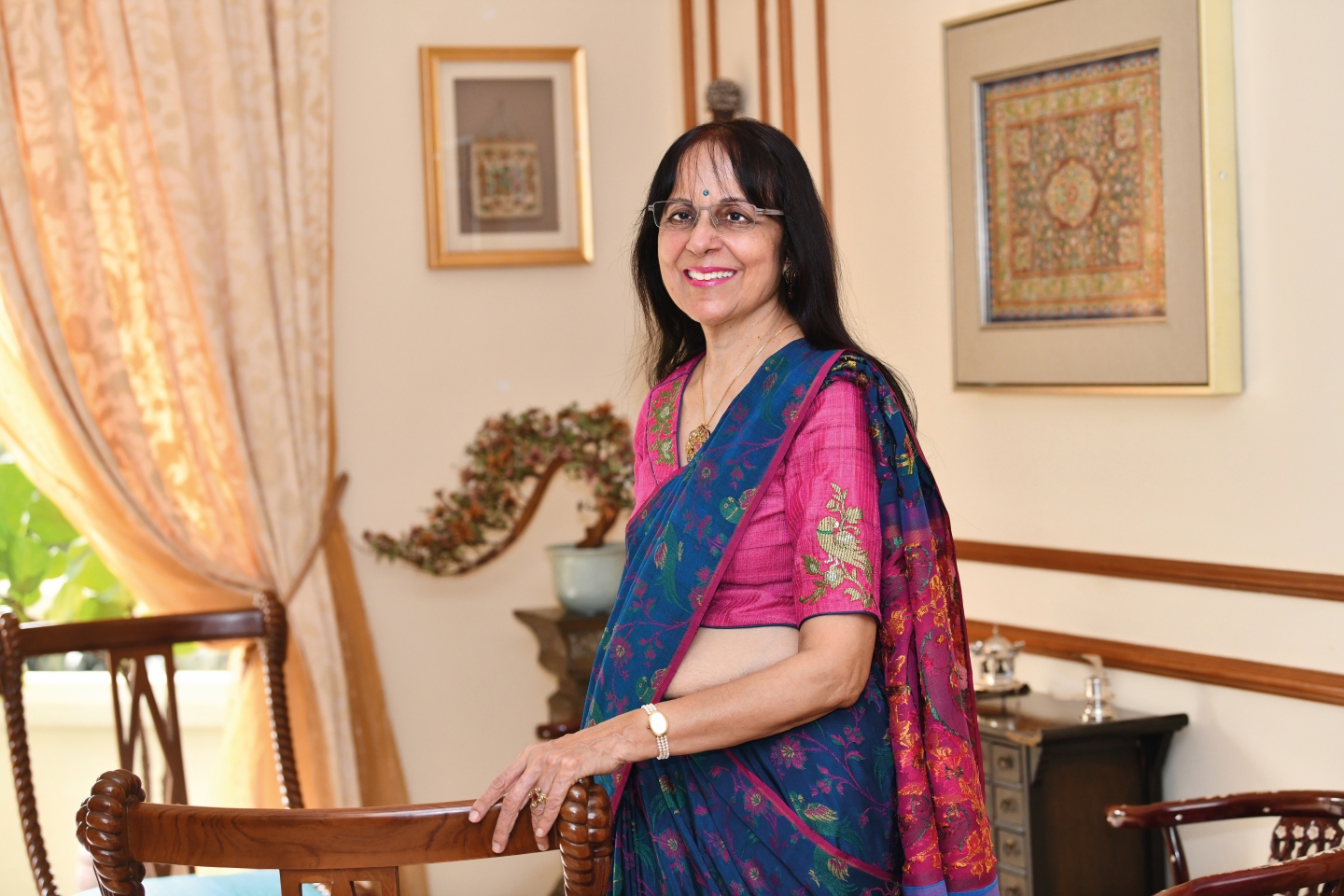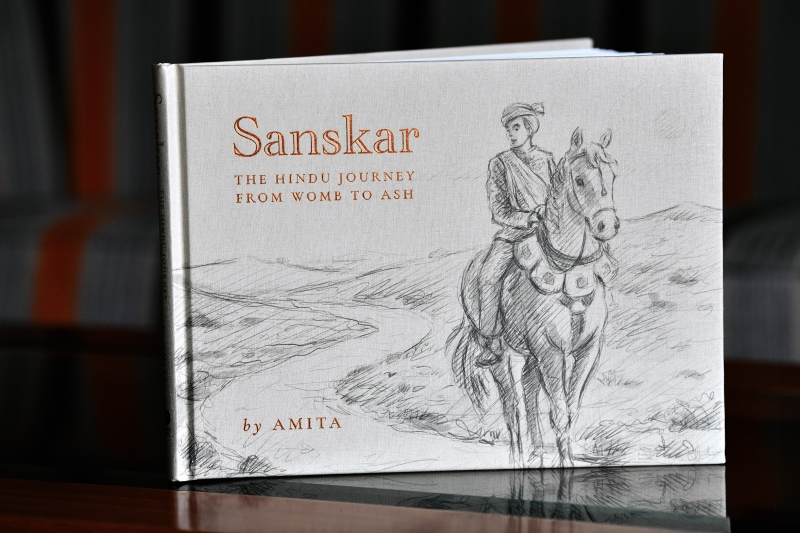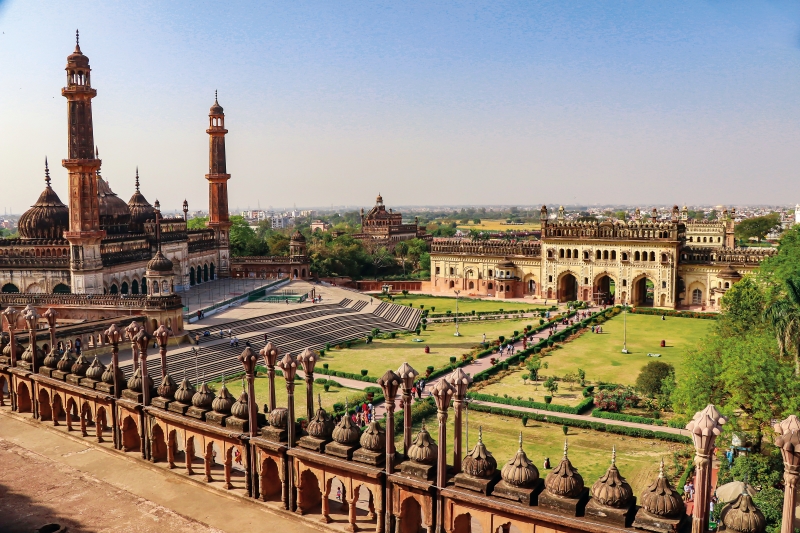
Amita shares her favourite things to experience in her birthplace of India (Photo: Shahrin Yahya/The Edge)
Options: Congratulations on Sanskar. What inspired the writing of your fifth book?
Amita Shah: I am a culture vulture. I feel very strongly that everybody must make the effort to retain their culture. Among Indians, the joint family system has eroded over time. The younger generation may want to observe sanskars (rites of passage) but there is a lack of documented information. This prompted me to collate the information in one place, hence this new book.
Tell us what readers can expect from Sanskar.
Many Sanskrit words cannot be translated into English, as the latter has a rather limited vocabulary. ‘Sanskar’ is a broad term. It includes external ones like the Sacred Thread ceremony and the wedding ceremony, all of which are rites of passage from one stage of life to another. ‘Sanskar’ also refers to attitude or behaviour towards others, like compassion, benevolence and piety.
Readers can expect details of 12 external sanskars widely observed by Hindus of the three north Indian states of Uttar Pradesh, Punjab and Rajasthan, wherever they may live. Each sanskar is elaborated, complete with a list of requirements for the ceremony, the probable reason for its observance and the gift presentation accompanying it. There are even recipes for the special foods given to a woman after childbirth. I have also commissioned Komeil Zarin to do a monochrome illustration for each sanskar. And somehow, the One Malaysia spirit is captured in it, via an Indian publisher, Muslim illustrator and Chinese book designer.
You are also launching the book to coincide with your wedding anniversary. Tell us why.
This book has been a labour of love, so to speak. It has been in the pipeline for 40-odd years and suddenly the thought came to my mind in January 2024 that I must write and launch it on our 50th wedding anniversary on Dec 14. What better way to celebrate our special day?
20241203_peo_amita_shah_msy_6.jpg

Sanskar follows on the success of your last publication, Celebrate & Cook. What are the main differences between the two?
My first two books, Yatra and Malayur, were my return gifts to guests at both my daughters’ weddings. The third, Neevism, was a celebration of grandmotherhood, presented to friends and relatives, on the birth of my third grandson. Celebrate & Cook, my fourth book, is about festivals and food traditionally cooked at these festivals. Sanskar, my latest, focuses on the rites of passage observed by Hindus from three north Indian states, when an individual passes from one stage of life to another significant stage.
Celebrate & Cook showcases 27 key north Indian festivals. Do you have a favourite?
Yes, I do. My favourite festival is Deepavali, or Diwali, as it is called in India, because the whole family takes part in the preparations, celebration and merry-making. Most other festivals involve fasting by women, feasting and enjoyment by the rest of the family.
A 50-year marriage (and counting) is a great achievement. What are some of your husband’s favourite home-cooked dishes?
We are vegetarians. My husband, Raj, loves puri with potato curry, pulao with kadhi, aloo paratha with homemade mango pickles and dahi (curds).
What are you reading right now?
I am reading Lords of the Deccan by Anirudh Kanisetti. I am a member of a book club based out of New Delhi. We read books pertaining only to Indian history and this is part of it. I am loving it because, being from north India, I don’t know much about the history of south India. So, I am finding this read very informative.
What are you listening to right now?
I always listen to old Hindi songs from Bollywood, yesterday, today and tomorrow, because the lyrics are meaningful, the language is pure and the music soulful.
146778511_l_normal_none.jpg

Where is home for you in India and what are some of the specialities from there?
For me, home in India is Meerut in Uttar Pradesh. It is where I was born and where I grew up. It is particularly famous for its various street foods and sweetmeats. Kachori-aloo with jalebi is a standard breakfast item, something to die for. And all kinds of chaat — matre ki chaat, pani puri, tikiya (potato cutlet) and gunjiya. Meerut is also well known for its sweetmeats, especially imarti and balushahi.
What’s on your 2025 travel list?
Post-Covid, I have been chasing a Hindu-India, if I may so call it. The main tourist attractions are recent, mostly made by the Moghuls or British. Temples, palaces and forts constructed by the ancient Hindu kings are what interest me most now. A visit to Hampi, the seat of the Chalukya and Vijayanagar empires in Karnataka state, was an eye-opener. Such majestic and artistic monuments have been dug out after centuries of being buried or camouflaged by agricultural growth! As part of my present bucket list, I intend to see the Chola temples of Tamil Nadu.
Which Indian cities do you think are the best to visit for the gourmet-minded traveller?
It would have to be Lucknow, Kolkata and Indore. Its street foods are reasonably priced, yet excellent. In fact, the non-decrepit restaurants in these three cities serve the best local fare, both vegetarian and non-vegetarian.
Describe your idea of a perfect weekend.
Waking up a little later, like 8am, instead of my usual 6.30am, then walking around the house to see what needs to be cleaned or polished. I’d then curl up on the sofa with the newspapers, cook a simple lunch and then go to the theatre for a play or watch a movie, and enjoy a meal out.
This article first appeared on Dec 16, 2024 in The Edge Malaysia.


